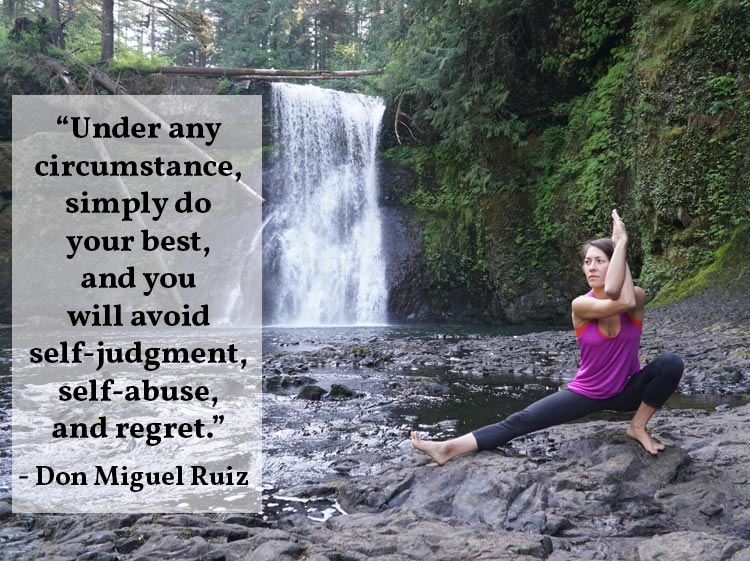 Ethical rules of yoga business form the foundation for the agreements you make as a yoga professional. They also create the framework from you make decisions about your business. This includes how you work with your clients, utilize your time, and stay the course even during tough times. Whether you’re a one-man-show or manage a large group, having an ethical code for your company can lead to many long-term benefits for your business.
Ethical rules of yoga business form the foundation for the agreements you make as a yoga professional. They also create the framework from you make decisions about your business. This includes how you work with your clients, utilize your time, and stay the course even during tough times. Whether you’re a one-man-show or manage a large group, having an ethical code for your company can lead to many long-term benefits for your business.
Upon completion of my 200-hour training years ago, I landed a teaching position at an eco-retreat in Brazil. This resort hosted people from all over the world who wanted a week of healthy living. It was my job my start their day with an energizing flow class, then assist them on outdoor adventures such as hiking and kayaking. Then, I led a yin or restorative class to close out the day.
From the outside, it appeared like the idyllic gig. Yet, from a business standpoint, it was a nightmare! Once I arrived in this foreign country, the company wanted to cut my pay rate. They also provided less-than-comfortable living quarters. To top it off, they ended up closing the retreat with a 24-hour notice to entire staff just months after I started.
It was incredibly stressful, to say the least. But it taught me that just because someone operates a yoga, or yoga-related, business, they are not always ethical.
To increase harmony within your staff and your credibility in your community, consider the 10 ethical rules of yoga business. Then, use our tips to implement them seamlessly into your organization to enhance your success.
Photo Credit: Diane Nicole Photography
ETHICAL FOUNDATIONS
Many of you are familiar with the famous Mahatma Gandhi quote that says “ Your beliefs become your thoughts. Your thoughts become your words. Your words become your actions. Your actions become your habits.”
Thus, the habits that you follow daily in your yoga business are really a reflection of the thoughts and values you hold at the center of your being.
This is important because ethics:
- Build trust in relationships
- Increase class engagement
- Enhance your level of influence with community
- Add clarity to your own decision-making
- Form a foundation for a code of conduct at your studio (or with your teaching)
- Allow you a greater understanding of yourself and your business
- Provide clarity about your message, and
- Give you the confidence to speak clearly and honestly about what you do
Here are 10 ethical rules for your yoga business that will demonstrate integrity and authenticity to your clients.
(1) ONLY WORK AT YOUR LEVEL OF UNDERSTANDING
Yoga is a practice that offers endless room for growth, and there are various stages at which you can be teaching the practice to others. You might have just graduated from your 200-hour training or you could have been teaching for the last decade (or longer!). In any case, the first ethical rule of yoga business is to operate at your own level of understanding.
There can be a sense of external pressure to teach postures beyond your own stage of progression. Or, you might observe social trends to focus your classes in a certain direction or you could even get uncomfortable when you don’t have answers to student questions. Instead of violating your own integrity–speaking or acting out of line–work from a level of truth.
Three ways to integrate this into your business:
- Establish a solid foundation in your own practice. By increasing your own skill set over time, you will have more to offer from a real, relatable experience.
- Teach what works for you and share your positive journey with others. Your own skills and interests can be of value to others. No need to be someone else to make a difference.
- When students ask a question, practice saying phrases like “I don’t have an answer for that right now, but I’ll look into that for you,” or “I’m not sure, but I’d like to research that in more detail.” It takes courage to do this. Yet your clients will appreciate your honesty and willingness to keep learning, too.

(2) KNOW YOUR PERSONAL VALUES
As the Gandhi quote above infers, values are at the foundation of everything you do. Values also create the “why” behind your actions. When you understand your values, you can act with more clarity and confidence. You’ll have a greater understanding of yourself and your purpose in the world. And, you’ll discover more balance and joy as you run your yoga business.
Some basic values include:
Abundance – Honesty – Selflessness – Respect – Love – Beauty – Originality – Reliability – Joy – Diversity – Imagination – Alignment – Wisdom – Clarity – Service – Health – Freedom – Community
How to enhance your value base:
- Pick 3-5 core values that are the foundation of your yoga business.
- List how these values are evident in your actions.
- Share these values with your clients so they understand your motives.
(3) KEEP YOUR PROMISES
While money might be exchanged for your services, trust is really the currency of the marketplace today. Trust is the promise you present to your clients. It’s the message behind your brand and the transformation you assure will occur in others by working with you. Each time your actions follow your words, trust increases between you and others.
Students rely on you to guide them safely on the yogic path. As you build this trust, you inspire others to take a leap from the known into the unknown. Plus, they’re willing to work with you and buy from you over and over as a result of keeping your promises.
Ask yourself the following questions:
- What promises do I make to my students? Clients? Community?
- How do I verbalize that promise to them?
- In what small ways are my actions reinforcing those promises? (This could be as simple as starting and ending a class on time)
(4) DEEPLY UNDERSTAND YOUR METHODOLOGY
It’s incredible to watch the evolving practice of yoga today! Numerous lineages have sprouted a variety of styles–each of which have value for the billions of unique people on the planet. Since you have experience in one (or some) of these, dive deep into the foundations of your style. This level of knowledge will make it much easier to explain the benefits of the practice to your students. And it will encourage them to more deeply understand themselves and their own personal journey.
To understand your methodology deeply, answer the following questions:
- In what methodology am I trained?
- What principles form the foundation of this style of yoga?
- What techniques do we utilize?
- How does this relate to, or differ from, other methodologies?

Photo Credit: Christina Cerda
(5) BE THE PERSON YOU PROFESS TO BE
This ethical rule of yoga business is similar to keeping your promises. While keeping your promises implies action, being the person you profess to be involves the kind of person you are during those actions. Are you even-tempered when approached by an upset client? Are you calm in the face of the unknown? Are you truly excited about the path you are on?
Simple ways to be the person you profess to be:
- Take time to meditate, get quiet, and know yourself deeply.
- Ensure your bio online matches who you are today. Said another way, keep your profile up to date. Also, share your wisdom and strengths with authenticity and invite students to trust you as their guide.
(6) TREAT YOUR STUDENTS AS EQUALS
Because you help create positive, transformative experiences for your students, it’s common for them to look up to you. And, it can be easy for your ego to find pleasure in the praise and admiration of your students. When the ego takes over, though, you can easily view your students as lower on the yoga totem pole.
Yet in reality, you and your students are both fellow travelers on the yoga journey. You just happen to be playing different roles when you are in front of the class and they’re on their mat. When you treat your students as equals, you demonstrate honor and respect.
Treating your students as equals involves:
- Staying out of judgment, for when you judge others you invite them to judge you back.
- Letting both praise and criticism be taken lightly
- A willingness to share what you have learned, and are continuing to learn, about the yoga practice.
- Verbalize your appreciation for your clients. Thank them for coming to class at the beginning and end of a session. Send personalized notes or emails. Be creative and have fun!
(7) GIVE CLIENTS YOUR BEST. ALWAYS.
As you run a yoga business, your energy levels will fluctuate. As a human, your moods, health, and skill sets will also change. Instead of expecting yourself to always be the same for your students, tune in to your current state of being. Decide what attitudes and actions will best serve you in the moment. Then decide to do your best with what you’re working with–giving no more and no less.
You can give your best to your clients when you:
- Show up.
- Under promise, but over-deliver.
- Are honest about lower than normal energy levels.
- Take time to care for yourself (apart from client interactions) so you can maintain higher energy levels more often.

(8) BE A REFERRAL RESOURCE
What I love about being a yoga professional is that there is not the pressure to serve everyone. In fact, that would be impossible! And you can’t do that either. So, you can adhere to another ethical rule of yoga business when you become a referral resource for other yoga professionals and businesses in your community.
Show confidence in yourself and skill set by:
- Creating a clear definition of your ideal client, and honoring your energy by serving that group more fully.
- Being willing to help people find the best fit for their needs.
- Referring people to other trusted professionals.
- Speaking with integrity about others, especially if you are faced with complaints or gossip.
- Creating boards on your Pinterest site that would refer people to great people and places in your community.
Not sure who to trust? Take some time this week to research your community. Make it a priority to get to meet others over the next few months and find other reliable resources in your area. This open, abundant spirit will speak volumes about your credibility, and give people the opportunity to refer right back your way.
(9) ASK STUDENTS QUESTIONS AFTER CLASS
In order to meet the needs of your students, you need to know what those needs are. This involves asking questions and then really listening to their answers. In fact, this act of listening also shows you appreciate your clients and want the best for them. And since their needs are continually changing–just like you are–it’s best to enter this listening mode often.
You can do this by staying after class to answer student questions. You might also send out regular feedback surveys as a studio owner about substitute and regular teacher performance.
Organize a group social or a studio-wide Q&A evening. Again, use your creativity to get people involved.
The takeaway: get feedback often!

(10) CREATE PASSION FOR IMPROVEMENT
Passion is the fuel you have for your practice and your yoga business. Its tapas. It’s fire, and fire is the element from which all of life derives. Fire not only provides warmth and light for man, but it’s also a source of joy, passion and enthusiasm. When set ablaze, it’s unstoppable.
The same passion that sustains your excitement for the practice can also inspire improvement and growth in your students. Your fire lights the way for your students. It encourages them to stay with the practice, push onward, and embrace new challenges with confidence.
You can keep your own passion alive when you:
- Learn about the flow state and find it in your life often
- Read books that will inspire you and your yoga business
- Set a learning schedule. If you’re done with formal education–where schedules are set for you–create one for yourself.
- Decide which books to read and courses to take over the next 3,6, and 12 months. This is sure to get you excited to grow, and even more excited to share that new info with your community.
PUTTING IT TOGETHER
These 10 ethical rules of yoga business can be used to establish a solid foundation from which to take action. Each principle can bolster your confidence, add clarity to your message, and increase the level of trust others have in you. Each ethical rule is easy to understand and fairly simple to implement. They just require focus and dedication on your part to do so.
Join us next week as we discuss how these ethical principles can be utilized in your business automation to increase connection with your community. Plus, we’ll reveal 25 fantastic themes you can use when leading your students on their mat!








Leave A Comment